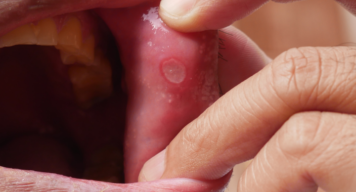Mouth Ulcers
Mouth ulcers are small, painful sores that develop inside the mouth, on the tongue, gums, or inner cheeks. They can be caused by a range of factors, including stress, injury, or a reaction to certain foods or medications. Mouth ulcers usually go away on their own within a week or two, but they can be uncomfortable in the meantime. Over-the-counter medications and home remedies such as saltwater rinses or topical gels may help to ease pain and speed up the healing process. In some cases, recurring or large ulcers may require medical attention.

Mouth ulcers can develop due to a variety of reasons, such as:
- Injury to the mouth from accidental biting, dental work, or sharp foods
- Viral or bacterial infections
- Stress or anxiety
- Hormonal changes
- Nutritional deficiencies, particularly of iron, vitamin B12, and folic acid
- Allergic reactions to certain foods or oral care products
- Medical conditions such as autoimmune disorders or gastrointestinal diseases
If there's anything you'd like to know more about, just let us know - we're always happy to provide additional information
Fill the details will get back to you shortly...

Mouth ulcers can be caused by a variety of factors, including stress, injury to the mouth, hormonal changes, certain medications, and underlying medical conditions.
You can try rinsing your mouth with salt water, applying a baking soda paste, or using over-the-counter oral numbing agents. Avoid spicy or acidic foods and drinks that can irritate the ulcer.
You should see a dentist if the ulcer lasts longer than two weeks, is very large, or causes severe pain or difficulty eating and drinking.
While some causes of mouth ulcers may be difficult to prevent, you can reduce your risk by practicing good oral hygiene, avoiding irritating foods, and managing stress levels.
While mouth ulcers can be a symptom of oral cancer, they are usually harmless and not indicative of cancer. However, if you have a persistent ulcer that does not heal, you should see a dentist for an evaluation.
Note: It is important to consult with a dentist or healthcare professional for personalized advice and treatment options.
Here are some post-treatment care tips for mouth ulcers:
- Avoid spicy, acidic, or salty foods that can irritate the ulcer and delay the healing process.
- Rinse your mouth with salt water or an antiseptic mouthwash to keep the ulcer clean and reduce the risk of infection.
- Apply a topical oral analgesic or oral pain relief gel to the ulcer to relieve discomfort and pain.
- Use a soft-bristled toothbrush to avoid irritating the ulcer and brush gently around the affected area.
- Avoid smoking or using tobacco products, as they can delay healing and irritate the ulcer.
- Manage stress levels, as stress can worsen the condition and delay the healing process.
- If the ulcer does not heal within two weeks or becomes increasingly painful, contact the dentist for further evaluation and treatment.

Working Hours
Monday - Saturday : 10:30 AM - 7:00 PM
Thursday: Holiday
Sunday: 10:30 AM - 1:00 PM
Call Us
+91 91081 24151
+91 99001 14151
Mail Us
happytohelp@vatsandparam.com